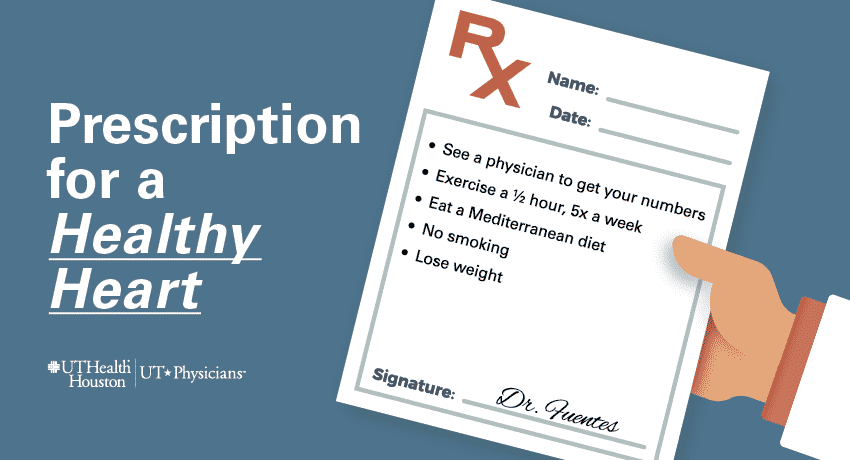Heart disease is the leading cause of death in the United States and accounts for 1 in 4 deaths, according to data from the Centers for Disease Control and Prevention. Fortunately, cardiovascular disease is preventable in most cases. With some lifestyle modifications, heart health may be reversed to a degree.
In recognition of American Heart Month in February, Francisco Fuentes, MD, cardiologist at UT Physicians, shares his “prescription” for a heart healthy lifestyle.
See a physician to get your numbers
“To keep your heart strong, it’s necessary to know three numbers: your blood pressure, blood cholesterol, and blood sugar. These numbers will determine your overall risk and tell you if you need to make some changes to lower it,” said Fuentes, professor of cardiovascular medicine and the Theodore R. and Maureen O’Driscoll Levy Endowed Professor in Cardiology Research at McGovern Medical School at UTHealth Houston.
According to Fuentes, the important numbers for heart health are: under 130/80 for blood pressure, below 190 for blood cholesterol, and less than 126 for blood sugar.
Blood pressure should be under 130/80

If the top number is above 130 and the bottom number is above 80, this indicates high blood pressure or hypertension. High blood pressure can damage the arteries and make them less elastic; this decreases blood flow to the heart.
Total cholesterol should be below 190
There is good and bad cholesterol. Total cholesterol should be below 190, and bad cholesterol, or low-density lipoprotein (LDL), should be below 100. Anything higher than 190 for total cholesterol or 100 for bad cholesterol signifies an elevated level. Bad cholesterol builds plaque inside the arteries, and too much of it can clog the blood flow to the heart.
Blood sugar should be under 126
For blood sugar, or blood glucose, the number before the first meal of the day should be less than 126. Anything higher than 126 in fasting mode (before breakfast) suggests a potential problem. Among other health complications, such as diabetes, too much sugar in the blood can harden the arteries and reduce blood flow to the heart.
Schedule a wellness exam with a family or internal medicine doctor to get these numbers.
Exercise a ½ hour, 5x a week
“Like any muscle, the more you use it, the stronger it gets. The less you use it, the weaker it gets. Regular exercise gets your heart rate up, so your heart muscle becomes more powerful and works more efficiently,” Fuentes said. “Physical activity is the best medicine for your heart — and your whole body. And it’s free.”
To keep a fit heart and prevent heart disease, children should exercise at least one hour a day and adults should exercise at least 30 minutes a day, five days a week.
Exercise does not require equipment, the doctor reminds. Pushups, situps, jumping jacks, and other gym class exercises still work. Play is also a form of exercise. Sports, dance, martial arts, and other physical activities a person enjoys will take the “work” out of a workout.
It is best to speak with a doctor before starting an intense exercise program.
Eat a Mediterranean diet
“In the 1980s, I wrote a research paper on the benefits of a palatable Mediterranean diet on the heart. My paper was not that popular. Today, U.S. News & World Report ranks it as the best diet,” Fuentes said.
Key components of the Mediterranean diet include:
- three servings of vegetables and fruits a day
- three servings of legumes (beans, lentils, etc.) a day
- one teaspoon of extra virgin olive oil a day
- three servings of nuts per week
- three servings of fish per week
- one serving or less of red meat per week
- white meat poultry
- fat-free or low-fat dairy products
Because the diet is plant-based rather than meat-based, it helps lower cholesterol levels in the blood. Plus, many of the staples, such as olive oil, legumes, nuts, and fish, contain monounsaturated and polyunsaturated fats. These healthy fats fight bad cholesterol as well, Fuentes added. The DASH and Flexitarian diets are other diets to consider for a heart healthy lifestyle.
Consult with a doctor or registered dietitian before starting a new diet.
No smoking
“Smokers are 2 to 4 times more likely to get heart disease because smoking causes so much different damage. The nicotine increases blood pressure and damages the cells in the arteries, and the carbon monoxide takes oxygen from the blood — and that’s just the start,” Fuentes said.
Fuentes does not recommend electronic cigarettes, or vaping, as a healthier alternative because they also contain nicotine and other harmful chemicals.
Find a way to kick the smoking habit — whether it is cold turkey, behavioral therapy, hypnosis, acupuncture, or over-the-counter nicotine patches, gum, or lozenges. If more help is needed, there are medications and nicotine inhalers and sprays a doctor can prescribe.
Schedule an appointment with a health care provider or behavioral specialist to discuss the options and receive expert advice to stop smoking.
Lose weight
“Being overweight or obese can lead to many health problems, like high blood pressure, high cholesterol, and diabetes. As we’ve discussed, these conditions damage the heart. Adults with excessive weight are also at greater risk of becoming seriously ill during a pandemic. For your heart and overall health, it’s best to be at a healthy weight,” Fuentes said.
A body mass index (BMI), which is a measure of body fat based on weight and height, can determine if someone is overweight according to medical standards. However, a simple way to assess body fat is to measure the circumference around the waist. Generally, a woman’s waist should not measure more than 35 inches and a man’s waist should not measure more than 40 inches.
A doctor can perform an accurate BMI and determine if it poses a higher risk for cardiovascular disease or other health problems. If so, the doctor can recommend a target weight and give diet and exercise guidelines to lose pounds in a safe and healthy manner.
See a health care provider before starting a considerable weight loss program.
Take good care of your heart by following the doctor’s orders.



